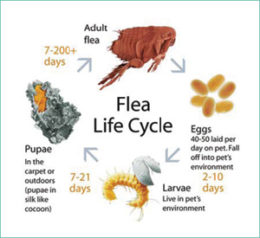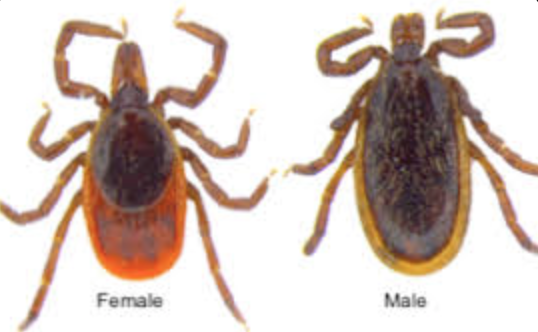Fleas aren’t just a nuisance for kittens; they’re a real threat to their health. These tiny pests feed on your kitten’s blood, which can lead to anemia, especially in young or small kittens. Anemia in kittens can cause fatigue, weakness, and sometimes more severe complications if not addressed.
Fleas Are Also Notorious For Transmitting Various Diseases To Kittens.
One of the most common is flea allergy dermatitis, where even a single bite can cause intense itching and discomfort. Kittens can also catch tapeworms from ingesting fleas during grooming sessions. These internal parasites can lead to nutritional deficiencies and weight loss, impacting a kitten’s growth and development.
Keep an eye out for telltale signs of a flea infestation. Excessive scratching, skin irritations, and small black specks, often referred to as “flea dirt,” on their skin or bedding are strong indicators. Early detection and intervention are key to ensuring your kitten remains healthy and happy.
Guarding Kittens Against Flea Infestations
Keeping fleas away from your kittens involves a mix of prevention techniques and regular maintenance. Start by maintaining a clean environment. Wash bedding weekly in hot water and vacuum regularly to remove any hidden flea eggs or larvae in your home.
Consider using veterinarian-recommended flea prevention products designed specifically for kittens. These products come in various forms, such as topical treatments, collars, or oral medications. It’s crucial to ensure any product is safe for kittens since not all flea treatments are suitable for younger or smaller cats.
For those who prefer natural methods, there are several safe options. A diluted apple cider vinegar spray, applied cautiously, can help repel fleas. Additionally, frequent grooming with a fine-toothed flea comb can help remove fleas and their eggs. Regular grooming also allows for early detection of any flea activity.
Check with your vet before trying any new flea treatments to make sure they’re appropriate for your kitten’s age and health. Protecting your kitten from fleas requires a proactive approach, but it’s worth the effort to keep your furry friend happy and healthy.
The Perils of Ticks on Kittens
Ticks can be just as concerning as fleas when it comes to kitten health. These outdoor parasites latch onto your kitten’s skin, feeding on their blood and potentially transmitting serious diseases. One major risk is that ticks can carry and transmit Lyme disease, which, although less common in cats than in dogs, can lead to fever, loss of appetite, and lethargy.
Aside from Lyme disease, ticks can also transmit other illnesses
like cytauxzoonosis—particularly dangerous for cats. If a kitten shows signs like high fever or listlessness, it’s important to get them checked out by a vet promptly as prompt intervention can make all the difference.
Detecting ticks early is crucial. Regular checks should be part of your routine, especially if your kitten spends time outdoors. Focus on hidden areas like behind the ears, under the collar, and between the toes, as ticks often hide in less visible spots.
Keep an eye on physical signs too. A small bump on your kitten’s skin might indicate an attached tick. Quick removal with the right tools can decrease the chance of disease transmission, so keeping a tick removal tool handy is a smart move.
Protective Measures Against Ticks On Kittens
Prevention is key to minimizing the risk of ticks on your kitten. Start with limiting their exposure to tick-infested areas. Keeping your grass trimmed and bushes well-maintained reduces hiding spots for ticks.
A visit to your veterinarian can help in choosing an effective tick prevention product suited for your kitten’s age and health. There are spot-on treatments, collars, and oral medications available specifically for young cats.
During tick season, daily checks are a must, especially if you live in an area known for tick activity. Make thorough inspections part of your routine—this means feeling for bumps and closely examining those hard-to-see areas.
If you find a tick, it’s important to remove it promptly and correctly. Using a tick removal tool or fine-tipped tweezers, grasp the tick close to your kitten’s skin and pull slowly to ensure the entire tick is removed.
Regular grooming doesn’t just help keep your kitten clean but also gives you the chance to check for ticks more frequently. This hands-on approach strengthens your bond while keeping your kitten safe.
In Conclusion To Kitten Fleas & Ticks
Having fleas or ticks on kittens is reason to be a bit worried. Due to the small size of kittens they are at a greater risk for death, diseases, etc., compared to an adult cat. If you find any fleas or ticks on your kittens, address it immediately to prevent any problems to your kittens health.
If you have any questions about any of the information in this article or about something we don’t have in here, please leave a comment below so we can try to help you.
If you have had your own experiences with fleas or ticks with your own kitten and would like to share your experience, please do so below. You may be able to help someone else who is going through the same thing.
Thank you for visiting Fleas B Gone, have a great day 🙂






